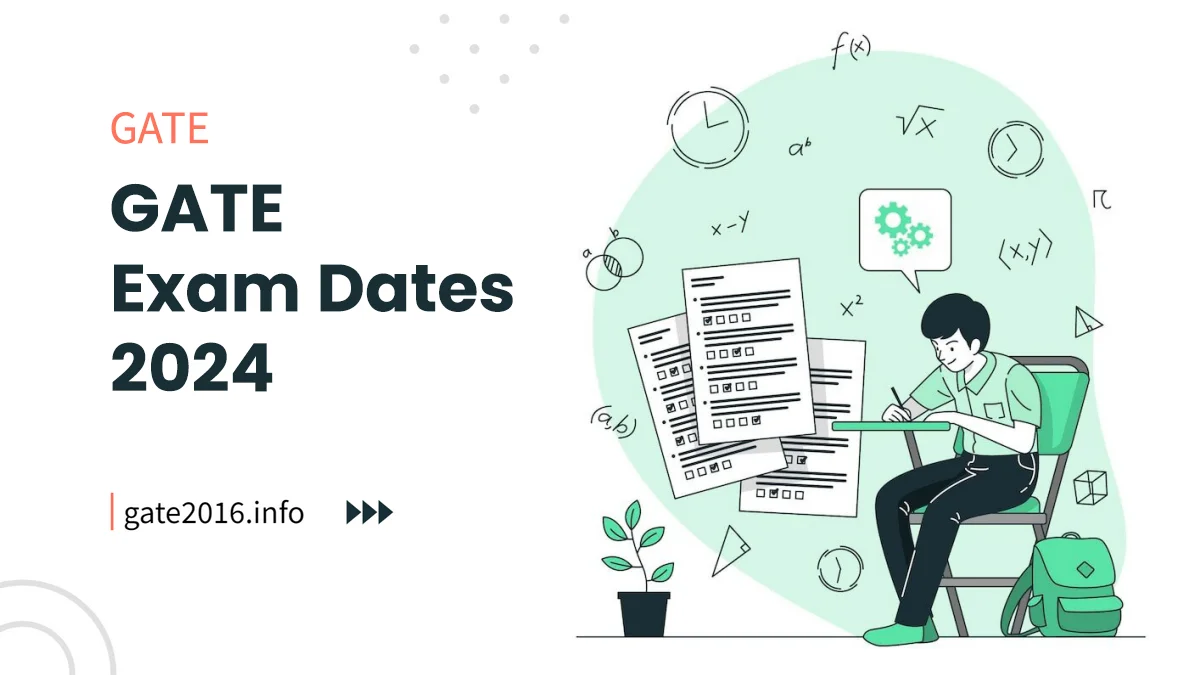Advertisements
Ratings

GATE 2024 PE Preparation – The Graduate Aptitude Test in Engineering (GATE) is a crucial examination for aspiring petroleum engineers, opening doors to advanced studies and promising career opportunities in the oil and gas industry.
This comprehensive guide aims to provide aspiring candidates in the field of Petroleum Engineering with a systematic approach to preparing for the GATE examination.
Contents
- 1. Introduction to GATE Petroleum Engineering
- 2. Overview of GATE Petroleum Engineering Syllabus
- 3. Developing a Structured Study Plan
- 4. Selection of Study Materials
- 5. Mastering Core Petroleum Engineering Concepts
- 6. Problem-Solving Practice
- 7. Reviewing Previous Years’ Question Papers
- 8. Taking Mock Tests
- 9. Effective Time Management Strategies
- 10. Implementing Revision Techniques
- 11. Staying Informed with Petroleum Engineering Trends
- 12. Managing Exam Stress
- 13. Final Weeks’ Preparation Strategy
- 14. Approaching Exam Day
- 15. Post-Exam Analysis and Next Steps
- Conclusion: Excelling in GATE Petroleum Engineering
- Additional Resources and References
- GATE Petroleum Engineering Guidance
- GATE Petroleum Engineering Preparation FAQs
- GATE Total Information & Guidance
1. Introduction to GATE Petroleum Engineering
GATE Petroleum Engineering evaluates candidates’ understanding of reservoir engineering, drilling technology, production processes, and other essential aspects of petroleum engineering.
Excelling in this exam not only showcases your proficiency in the field but also paves the way for innovative contributions to the oil and gas sector.
2. Overview of GATE Petroleum Engineering Syllabus
A thorough understanding of the GATE Petroleum Engineering syllabus is pivotal in crafting an effective study plan.
Let’s break down the syllabus into subjects and key topics:
Table 1: GATE Petroleum Engineering Syllabus Breakdown
| Subject | Key Topics |
|---|---|
| Reservoir Engineering | Fluid properties, well testing, reservoir simulation |
| Drilling Technology | Drilling operations, bits, drilling fluids |
| Production Processes | Well completions, artificial lift, well deliverability |
| Petrophysics | Porosity, permeability, fluid saturation |
| Well Testing | Pressure transient analysis, build-up tests |
3. Developing a Structured Study Plan
A well-structured study plan is the foundation of effective preparation:
- Customized Schedule: Tailor a study plan to your strengths and areas of improvement.
- Subject Allocation: Allocate study time for each subject based on its weightage in the exam.
Table 2: Sample Study Plan
| Week | Subjects/Topics | Time Allocation |
|---|---|---|
| 1-2 | Reservoir Engineering | 10 hours/week |
| 3-4 | Drilling Technology | 12 hours/week |
| 5-6 | Production Processes | 10 hours/week |
| 7-8 | Petrophysics | 12 hours/week |
| 9-10 | Well Testing | 10 hours/week |
4. Selection of Study Materials
Choosing the right study materials is crucial for effective preparation:
Table 3: Recommended Study Resources
| Subject | Books | Online Resources |
|---|---|---|
| Reservoir Engineering | “Reservoir Engineering Handbook” by Tarek Ahmed | NPTEL’s Reservoir Engineering Course |
| Drilling Technology | “Drilling Engineering” by J.J. Azar | Coursera’s Drilling Technology Courses |
| Production Processes | “Production Operations” by Thomas O. Allen | edX’s Oil and Gas Production Courses |
| Petrophysics | “Petrophysics” by Djebbar Tiab | YouTube’s Petrophysics Lectures |
| Well Testing | “Well Test Analysis” by John Lee | MIT OpenCourseWare’s Petroleum Courses |
5. Mastering Core Petroleum Engineering Concepts
Building a solid foundation in core concepts is essential:
- Reservoir Engineering: Understand fluid properties, well testing, and reservoir simulation techniques.
- Drilling Technology: Focus on drilling operations, types of bits, and drilling fluid properties.
- Production Processes: Grasp well completion methods, artificial lift techniques, and well deliverability.
- Petrophysics: Study porosity, permeability, and fluid saturation concepts.
- Well Testing: Comprehend pressure transient analysis and build-up test principles.
6. Problem-Solving Practice
Regular problem-solving practice enhances your skills:
- Reservoir Engineering: Solve problems related to fluid flow, well testing, and reservoir simulation.
- Drilling Technology: Practice problems involving drilling operations, bit selection, and drilling fluid properties.
- Production Processes: Work on well completion problems, artificial lift calculations, and deliverability analysis.
- Petrophysics: Solve problems on porosity, permeability, and fluid saturation calculations.
- Well Testing: Practice pressure transient analysis and build-up test problems.
7. Reviewing Previous Years’ Question Papers
Solving previous GATE Petroleum Engineering papers offers insights:
Table 4: Benefits of Solving Previous Years’ Papers
| Benefit | Description |
|---|---|
| Identify Question Patterns | Recognize common question formats |
| Enhance Time Management | Practice managing time effectively |
| Understand Exam Difficulty | Gauge the difficulty level of questions |
| Self-Assessment | Evaluate your preparedness and progress |
8. Taking Mock Tests
Simulating exam conditions through mock tests is essential:
Table 5: Benefits of Taking Mock Tests
| Benefit | Description |
|---|---|
| Simulate Exam Environment | Replicate real exam conditions |
| Improve Time Management | Enhance time allocation skills |
| Boost Confidence | Build confidence before the exam |
| Identify Weak Areas | Identify areas needing more focus |
9. Effective Time Management Strategies
Efficient time management during the exam is crucial:
Table 6: Time Management Strategy
| Section | Recommended Time Allocation |
|---|---|
| General Aptitude | 15 minutes |
| Technical Sections | 75 minutes each |
10. Implementing Revision Techniques
Regular revision is vital for retaining knowledge:
- Revision Schedule: Allocate time for revisiting crucial topics.
- Concise Notes: Create summary notes and flashcards for quick review.
11. Staying Informed with Petroleum Engineering Trends
Staying updated with recent developments is essential:
- Follow Industry Journals: Subscribe to petroleum engineering journals.
- Participate in Webinars: Attend webinars to learn about emerging technologies.
12. Managing Exam Stress
Effective stress management is crucial:
- Relaxation Techniques: Practice meditation, deep breathing, and relaxation exercises.
- Balanced Routine: Include physical exercise, healthy eating, and breaks in your routine.
13. Final Weeks’ Preparation Strategy
In the final weeks, focus on intensive revision of key subjects:
- Focused Revision: Allocate more time to challenging subjects and complex problems.
- Additional Mock Tests: Take extra mock tests to refine your preparation.
14. Approaching Exam Day
Stay composed and approach the exam day with confidence:
- Read Instructions Carefully: Understand question patterns and instructions clearly.
- Effective Time Allocation: Allocate time wisely based on question weightage.
15. Post-Exam Analysis and Next Steps
Evaluate your performance and plan your next steps:
- Performance Analysis: Identify strengths and areas for improvement.
- Future Planning: Decide whether to pursue higher studies or explore petroleum engineering career opportunities.
Conclusion: Excelling in GATE Petroleum Engineering
Preparation for GATE Petroleum Engineering requires dedication, meticulous planning, and a structured approach.
By adhering to the strategies and tips outlined in this guide, aspiring petroleum engineers can substantially enhance their chances of excelling in the GATE exam and making significant contributions to the oil and gas industry.
Additional Resources and References
Explore the recommended textbooks, online courses, petroleum engineering associations, and practice papers mentioned in this guide for additional resources and references.
These resources will further enrich your understanding and preparation for the GATE Petroleum Engineering exam.
GATE Petroleum Engineering Guidance
- How to Prepare for GATE Petroleum Engineering: A Comprehensive Guide
- GATE PE Previous Year Solved Papers – (2023-2016)
- GATE 2025 Books: Petroleum Engineering
- GATE PE Syllabus 2025: Petroleum Engineering
GATE Petroleum Engineering Preparation FAQs
What is GATE Petroleum Engineering (PE)?
GATE PE is an examination conducted by the Indian Institute of Technology (IIT) for admission into postgraduate programs in Petroleum Engineering and related fields.
It assesses candidates' knowledge and understanding of petroleum engineering concepts and serves as a gateway to higher education and career opportunities in the oil and gas industry.
What are the important subjects to focus on for GATE Petroleum Engineering preparation?
Key subjects to focus on include reservoir engineering, drilling engineering, production engineering, well completion, reservoir simulation, fluid properties, and enhanced oil recovery techniques. Refer to the official GATE syllabus for Petroleum Engineering for a comprehensive list.
How should I prepare for the GATE PE exam?
Effective preparation involves creating a study plan based on the GATE syllabus. Utilize standard textbooks, reference materials, and online resources for each subject.
Practice solving previous years' question papers and mock tests to become familiar with the exam pattern and improve your problem-solving skills.
Additionally, stay updated with industry trends and technologies in the petroleum engineering field.
Are there any recommended books or resources for GATE Petroleum Engineering preparation?
Yes, some recommended books and resources include:
- 'Reservoir Engineering: Fundamentals and Applications' by L.P. Dake
- 'Drilling Engineering' by J.J. Azar and G. Robello Samuel
- 'Production Engineering: The Complete Guide to Field and Operations' by Bradley L. Jones
- 'Reservoir Simulation: Mathematical Techniques in Oil Recovery' by Luis A. Barone
- Online courses, lecture videos, and research articles from reputable institutions and platforms related to petroleum engineering.
What is the exam pattern for GATE Petroleum Engineering, and how should I approach it?
GATE PE typically consists of multiple-choice questions, multiple-select questions, and numerical answer type questions.
Questions cover various aspects of petroleum engineering, including reservoir analysis, drilling techniques, production operations, and fluid properties.
Start by answering questions you are confident about and manage your time efficiently. For numerical answer type questions, ensure precision in your answers.
A strong understanding of petroleum engineering concepts, reservoir management, and production techniques is essential for success in the exam.
Recent Posts
- AAI Through GATE 2024 – JE (Junior Executive)
- M Tech and MS Programs Through GATE and GRE: Navigating Postgraduate Options
- Job Opportunities After GATE 2024 in India: What You Didn’t Know!
- BSPHCL Through GATE 2024 – 40 AEE
Related Tags
How to prepare for gate petroleum engineering pdf 2024 , How to prepare for gate petroleum engineering quora 2024, gate petroleum engineering syllabus 2024, gate petroleum engineering cut off 2024, gate petroleum engineering question paper 2024, gate petroleum engineering books 2024, gate petroleum engineering quora 2024, gate in petroleum 2024
| GATE (Reasoning & Aptitude & Maths) Books |
| GATE Guide Books |
GATE Total Information & Guidance
Click below given links to get further information.





